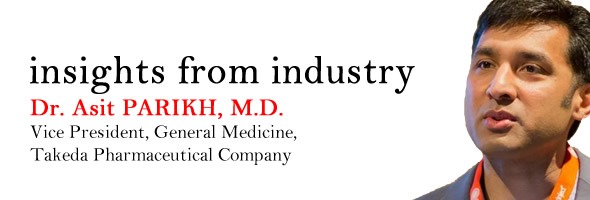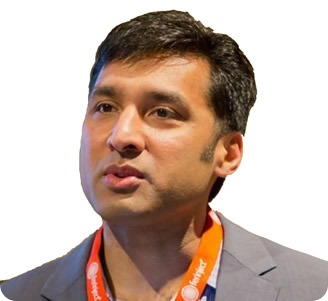
Please can you outline the similarities and differences between ulcerative colitis (UC) and Crohn’s disease (CD)?
Ulcerative colitis (UC) and Crohn’s disease (CD) are both relapsing and remitting chronic diseases of bowel inflammation. By that I mean they flare and physicians try to get the flare under control and try to induce remission. However, despite a number of treatments available, they tend to relapse.
It is not always predictable when they’ll strike but the conditions tend to affect very young patient populations – typically in the prime of their lives.
The similarities are numerous. They both have an immune mechanism which means that they may result from the body using what are normally protective mechanisms for fighting infections. These mechanisms go awry and trigger an abnormal immune reaction or inflammation in the intestinal tract.
Some of the common symptoms are diarrhea, intestinal bleeding, abdominal pain and fatigue.
One of the key differences between these two conditions is that UC involves the lower bowel or the colon. It can involve any portion of the colon, from very limited involvement in the rectal area to the entire colon. It is typically characterized by bleeding because bleeding is the most prominent symptom – it is very noticeable.
Crohn’s disease on the other hand can impact any part of the intestinal tract – from the mouth to the anus. It usually involves at least the last part of the small intestine as well as the colon.
They are both very difficult diseases to treat. There are a number of drugs that are effective in both but Crohn’s disease is typically considered more problematic because it can involve the entire intestinal tract.
When the entire intestinal tract is affected, surgery alone may not be able to solve the problem.
Who do the conditions usually affect?
They can actually affect anyone from new-borns to people in their 90’s for their first diagnosis. But where you typically see a peak is in the 20-30 year-old age groups – that is the centre of one of the peaks of when IBD comes on. From the teens to the 40’s might be a very common age for first diagnosis.
Interestingly, we’ve noticed from the literature that in the last decade or so a number of epidemiological studies have also demonstrated a bi-modal peak. There is another smaller peak of people in their 60’s having their first presentation of UC and CD.
What is currently known about the causes of UC and CD?
Unfortunately, not enough. Certainly, there are some principles that are well understood. We do know that this is an instance where the body’s normally protective mechanisms are “revved up” or up-regulated in more scientific terms. This creates inflammation which is, in some instances – in its normal conditions – protective and in these diseases is out of control.
All of the therapies that are on the market today are centred on trying to calm down or address the inflammation.
There have been a number of studies in the last few years that have demonstrated certain genes being involved. Genes are heritable - we get them from our parents. There’s also thought to be an environmental factor. But, there’s no clear dietary association or other clear risk factor that is known.
On top of that, one other thing that is important is that in places in the world where these diseases were not that common, we’re seeing a fairly substantial rise. I’m talking about places like South-East Asia, Africa and so forth where this disease was not even described in the literature 30-40 years ago and now it has become quite routine.
What treatments have traditionally been used for UC and CD?
The treatments that are most common have been around for a long time. They are generally considered to be more effective in UC first-line treatments – by this I am referring to 5-aminosalicylates.
These are drugs that are not very well absorbed and they tend to have their anti-inflammatory action within the gut. They are taken by mouth and are given multiple times a day.
They are not quite as effective in CD as they are in UC. They are really for patients with mild-to-moderate inflammation.
There are also a class of agents called thiopurines which have been around and been used for many different immune disorders like rheumatoid arthritis and so forth.
There is some difficulty tolerating some of these agents but they have been in widespread use and are somewhat effective at maintaining remission.
Over the last decade there has really been a revolution in the care of inflammatory bowel disease by the advent of biologic therapies. Most of these biologic therapies are focussed on blocking what we call a mediator of inflammation, a cytokine, which is a key molecule in the process of inflammation. It sends out a stress signal which calls other cells to come to the inflamed bowel and worsen the inflammation.
These biologic agents are focussed on blocking a molecule called Tumor Necrosis Factor, TNF. They are commonly referred to as TNF blockers. TNF blockers have been used in CD for about a decade now and in UC for the last 7-8 years.
Why is there an unmet medical need for UC and CD?
The studies of TNF blockers demonstrated an unprecedented effect in patients with moderate to severely active IBD. In spite of this big impact that they’ve had in the treatment of both UC and CD, controlled clinical studies have shown that only about a third of patients are in remission at the end of a year.
From that, about two thirds of patients are quite possibly better off than when they started the medication but are not meeting the goals of therapy. So there is a sizeable pool of patients that still stand to benefit from additional therapies.
The other important thing to note is that when a patient has failed one TNF blocker or lost response to it, then they actually have a lower response to another TNF blocker. From that there has been a lot of thought and interest in the community at being able to change the mode of action of how we are trying to treat this condition.
For that reason, when you put the two together, both the combination of inadequate response and loss of response with TNF blockers, these are really the main reasons that there is an unmet medical need.
Where can readers find more information?
www.takeda.com
About Dr Asit Parikh
 Asit Parikh, M.D. Ph.D., earned his Ph.D in Biochemistry and MD degrees from Vanderbilt University, completed internal medicine residency at the University of Pennsylvania, and subspecialty training in gastroenterology at the Massachusetts General Hospital, with postdoctoral work in Cancer Biology at MIT
Asit Parikh, M.D. Ph.D., earned his Ph.D in Biochemistry and MD degrees from Vanderbilt University, completed internal medicine residency at the University of Pennsylvania, and subspecialty training in gastroenterology at the Massachusetts General Hospital, with postdoctoral work in Cancer Biology at MIT
In 2006, Dr Parikh joined the Clinical Research division at Millennium Pharmaceuticals. The GEMINI program represents the largest controlled clinical trial program ever conducted in inflammatory bowel disease.
Since January 2012, Dr Parikh has served as Therapeutic Area Lead for General Medicine at Millennium’s parent company, Takeda Pharmaceuticals where he helps guide Takeda’s global R&D strategy.
Dr Parikh maintains a commitment to research, patient care and teaching. He has authored a number of scientific manuscripts and presented at major meetings. He also remains actively engaged in the practice of gastroenterology and internal medicine as a part-time coverage staff physician at Newton-Wellesley Hospital in Newton, MA.